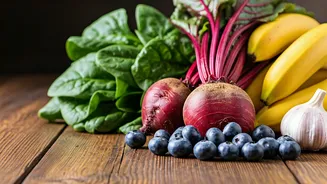Peppermint’s Soothing Touch
Peppermint has a long history of being used to ease digestive troubles, especially those related to gas and bloating. Peppermint contains menthol, which
is a natural muscle relaxant that can help soothe the muscles of the digestive tract. This relaxation can help reduce the spasms that cause bloating and gas. Studies suggest that peppermint oil capsules are particularly effective. These capsules are designed to release the oil in the intestines, where the benefits are most needed. You can take peppermint in several forms: as tea, or by adding peppermint oil to meals, or even through supplements. It's a simple, natural way to potentially reduce digestive discomfort and boost overall digestive health.
Ginger's Digestive Power
Ginger is another powerful natural remedy to combat bloating and gas. It contains gingerol, a compound known for its anti-inflammatory and antioxidant properties. Ginger can speed up the emptying of the stomach, which can help to reduce bloating and feelings of fullness. It also aids in the breakdown of food, making digestion easier and reducing gas production. You can use ginger in multiple ways: by grating it into dishes, making ginger tea, or taking ginger supplements. Incorporating ginger into your diet is a flavorful and effective way to support healthy digestion and potentially find relief from bloating.
Fennel Seeds for Relief
Fennel seeds have been used for centuries to relieve digestive problems. They contain compounds that can relax the muscles of the digestive tract, which helps to reduce bloating and gas. Fennel seeds can also stimulate the production of digestive enzymes, which further aids in the breakdown of food and reduces the formation of gas. You can eat fennel seeds directly or include them in various dishes. Fennel tea is also a popular option. By adding fennel seeds to your routine, you're embracing a time-tested remedy that can promote comfort and ease after meals.
Chamomile’s Calming Effect
Chamomile is famous for its relaxing qualities, which extend to the digestive system. It has properties that can reduce inflammation and muscle spasms in the gut. By calming the muscles, chamomile can help alleviate bloating and discomfort. Drinking chamomile tea can be particularly soothing after meals. The warmth and gentle nature of the tea make it a perfect choice for those seeking relief from digestive distress. Chamomile not only comforts your body but also offers a pleasant way to end the day, aiding both digestion and relaxation.
Turmeric’s Anti-Inflammatory Action
Turmeric, with its active compound curcumin, is a potent anti-inflammatory agent. Inflammation can play a big role in digestive issues like bloating and gas. Turmeric's anti-inflammatory properties can help reduce swelling and irritation in the gut, thereby reducing discomfort. Curcumin also aids in breaking down fats, thus improving digestion. It's best absorbed when taken with black pepper, which helps your body to take in curcumin more effectively. You can use turmeric in your cooking or as a supplement. Using turmeric is not only good for your digestion but also boosts your overall health, thanks to its many health benefits.
Papaya for Enzymes
Papaya contains papain, an enzyme that helps break down proteins and ease digestion. This can reduce bloating and gas, especially after a meal high in protein. Papain helps to break down proteins more efficiently, which reduces the load on the digestive system. You can eat papaya fresh or use it in smoothies. Including papaya in your diet is a delicious and beneficial way to support your digestive health and minimize the effects of bloating.
Probiotic-Rich Yogurt Benefits
Yogurt containing probiotics has been proven to improve gut health, which helps to minimize bloating and gas. Probiotics are beneficial bacteria that help maintain a healthy balance in your gut microbiome. This balance is crucial for efficient digestion and the prevention of gas formation. Probiotics can also improve the absorption of nutrients. Include yogurt in your diet to help boost digestive health. Choose yogurts with live and active cultures for the best results. The regular use of probiotic-rich yogurt is a simple way to strengthen your digestive system and promote overall wellness.
Pineapple's Digestive Enzymes
Pineapple contains bromelain, an enzyme that aids in digestion by breaking down proteins. This can alleviate bloating and gas, especially after consuming protein-rich foods. Bromelain also possesses anti-inflammatory qualities, which can further benefit your gut health. Consuming pineapple can make digestion easier and improve nutrient absorption. Enjoy pineapple as a snack, in salads, or smoothies. By including pineapple in your diet, you're adding a flavorful way to improve digestion and reduce discomfort.
Bananas for Potassium
Bananas are rich in potassium, which can help regulate sodium levels and reduce water retention, a key cause of bloating. Bananas also contain fiber, which promotes healthy digestion and reduces the chances of constipation, which is a key contributor to bloating. Bananas are easy to eat and can be incorporated into your diet quickly. Eating a banana can give you instant energy while helping your digestion and minimizing bloating. Regular consumption of bananas can support your gut health in the long run.
Oats for Fiber Intake
Oats are a great source of fiber, which is crucial for maintaining digestive health. Adequate fiber intake can help prevent constipation, a common cause of bloating and gas. Fiber adds bulk to your stools, allowing them to pass through your intestines more smoothly. Oats can also help regulate blood sugar levels, which can further reduce bloating. Starting your day with a bowl of oats is a simple way to boost your fiber intake and support healthy digestion. Incorporating oats into your diet ensures a filling and nutritious start, while also promoting overall digestive wellness and reducing bloating.












